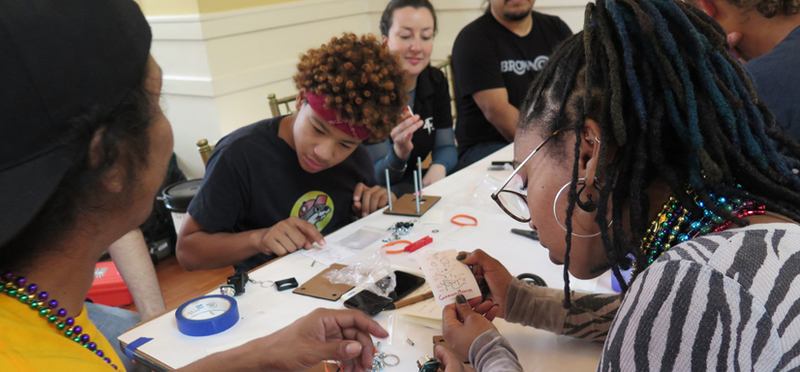
Welcome to Public Lab
We're so happy to meet you! This page is to help newcomers get started with the Public Lab community. For people first encountering Public Lab, there are a lot of unknowns about how we're organized, how we collaborate, our culture, and the personal relationships that fuel our work.
Our community aspires to be a respectful place. Please read and abide by our Code of Conduct.
Who is Public Lab?
We're an open community and network that anyone can join, including you! We especially welcome people concerned with local environmental problems, but we need all kinds of people. This is a collaborative research effort including activists, makers, scientists, technologists, curious people, and assorted hybrids of all of the above.
We are hosted by a non-profit with a paid staff, but our work wouldn't be possible without our network of local organizers and community members. Together, we try to understand and address environmental problems that affect people, with inexpensive and accessible do-it-yourself techniques. But it only works if we all share our ideas and innovations!
Getting Started:
There are a number of ways to get started on Public Lab. We host an Open Call every Tuesday to welcome newcomers, and connect people to resources and ideas available on Public Lab. We also host a once-monthly OpenHour call on a selected topic, generally the first Monday of each month.
The Public Lab website is supported and maintained by contributions from a robust community of coders. We have a process for welcoming first-time code contributors. Learn more at code.publiclab.org.
If you're ready to get going now, check out a few things below that you can do to get started:
Have an environmental concern or question you'd like support on? Here are some things you can do on Public Lab:
- Post a question using the Question & Answer forum.
- Post an Issue Brief to share about an environmental concern and reach out to others for ideas.
- Search methods for environmental monitoring ideas.
Looking to contribute ideas, or to support other people's environmental exploration?
- You can Follow tags on topics that interest you, and get alerts when people post questions related to that topic.
- Check out the requests people have shared.
- Help build Public Lab's open source code base. Visit code.publiclab.org.
- Donate to Public Lab and help to grow the community and resources available here.
Looking to learn more about what people are sharing? Here are some good ways to check out what people are up to:
- The dashboard shows a feed of all the recent activity on Public Lab
- Check out new posts and stories on the blog
- Follow Public Lab on social media
Benefits
- A community of diverse and helpful fellow researchers to ask for support and advice -- by signing up on the website you may join several relevant mailing lists
- A growing body of open source research and resources to leverage in your work
- You may use, reuse, adapt, improve, and distribute any Public Lab research without even asking permission! (Find out how at http://publiclab.org/licenses)
- A place to publish your own work and to build a body of research online
Responsibilities
- To share what you do with the rest of the research community (by posting on this website, see http://publiclab.org/join)
- To help others leverage your and Public Lab's research and resources
- To cite our community (which you're now part of) when presenting or publishing your work, if you based it on or drew ideas from the Public Lab research community.
Welcome Committee
The welcome committee was created to do just that -- welcome people first encountering Public Lab, and provide a personal connection for explaining our culture, ethics, digital infrastructure, and organizational structure.
| Username |
|---|
| warren |
| liz |
| Gesper666 |
Login/Sign up to join.
How to use this website
Learn more about how to use the site, the different types of pages that exist, and how best to use them here.